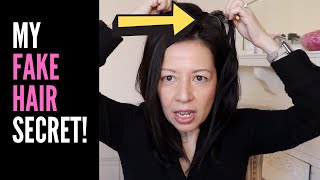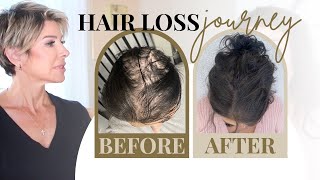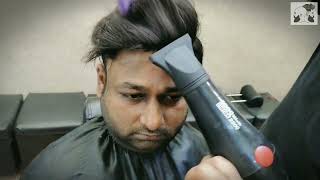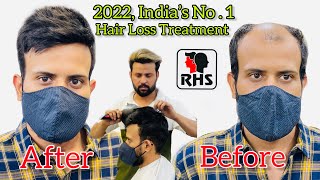How to Deal with Hair Loss or Thinning During Menopause
- Posted on 30 December, 2021
- Hot Topic
- By SNY Admin
Hair loss in women is not always as simple as it is in most men. Hereditary male pattern baldness accounts for approximately 90% of all cases in men. Hair loss in women, on the other hand, can be caused by a variety of conditions and circumstances. There are PCOS hair loss or even Menopausal hair loss that can be prevented not just with SMP treatment.
Hair loss during menopause is caused by a decrease in estrogen and progesterone production. These hormones promote faster hair growth and keep the hair on the head for longer periods of time. When estrogen and progesterone levels fall, hair grows more slowly and becomes much thinner and hair follicles shrink.
All hair follicles are on a cycle, and significant physical or emotional stress can push more follicles than usual into the resting phase, which can lead to a significant amount of hair loss at one time.
Other Causes of Menopausal Hair Loss
Such a change in your appearance can be understandably distressing. But why does menopause affect your hair?
Hormones
When levels of estrogen and progesterone drop during menopause, the effects of androgens (male hormones) increase. As a result, hair grows at a much slower rate and hair follicles shrink, which produces weaker hair and ultimately causes hair loss. As the body responds to the fluctuations in hormones, numerous physical changes occur. Androgens shrink hair follicles, which causes hair loss on the head. Also, with the age, the ovaries begin to decrease the number of sex hormones that are normally produced.
There are also hair changes that are associated with other uncomfortable symptoms such as skin changes, hot flashes, and mood swings. It is important to talk to your doctor and ask for advice for your treatment options if you discover there is a hormonal imbalance.
Medication
Some medications have side effects that could include hair loss. Make sure to talk to your doctor if you’ve noticed significant hair loss and you think that your medicine might be the cause.
Hair Dryers
Extreme heat from hair dryers causes the water under the outermost layer of the hair to form bubbles that lead to breakage of the hair.
Menopausal Hair Loss Prevention
We need to take into consideration the many different factors affecting hair growth, hair fall, and hair distribution. Other factors that may contribute to hair loss during menopause include a genetic predisposition, fluctuating hormone levels, high levels of stress, nutritional deficiencies, and some medications.
Reduce Stress
It is really normal to feel self-conscious when you are experiencing hair thinning during the menopausal transition. Most women experience overall hair thinning rather than noticeable bald spots.
To reduce stress levels, try yoga and other exercises that clear and relax the mind. Reducing and finding ways to manage stress are important parts of maintaining overall health.
Get Moving
Exercise is an important part of living a healthy lifestyle. When you incorporate exercise into your daily routine, you will feel stronger and happier. It also helps to prevent some of the other menopausal symptoms, such as mood swings, weight gain, and insomnia. All of these factors contribute to hormonal balance, which promotes healthy hair growth.
Choose a form of exercise that is comfortable for you. Consider going for a walk with a friend, joining a gym, or going for a run.
Hydrate
In order for your body to function properly, it must be properly hydrated. Drink plenty of water throughout the day and avoid juices, sodas, and other flavored drinks that contain more sugar than your body requires. The amount of water required varies from person to person and is determined by a variety of factors such as overall health and exercise intensity. However, as a general rule, you should aim for eight 8-ounce glasses of water per day.
Consume Iron
There are so many vitamins and minerals they were told to make sure we have enough of, but which ones should we be focusing on for hair health.
An iron deficiency can often be the cause of hair loss and therefore during menopause it is essential to consume enough iron in your diet. This will help to ensure healthy hair because, like niacin, it contributes to increased blood flow to the scalp and thus improved hair follicle maintenance.
Your GP might call for some blood tests, to check for healthy levels of iron and various vitamins, along with your thyroid and other hormones. If the blood tests come back normal, hair loss treatment minoxidil is sometimes prescribed, which many women find helpful.
Healthy Diet
As estrogen levels decrease, the body becomes more susceptible to conditions such as fractures, constipation, anemia, and weight gain. A healthy diet during the menopausal transition and after the process should contain fresh fruits and vegetables and other foods that are rich in iron and fiber.
There are foods that may naturally increase estrogen and help reduce menopausal symptoms. Grapes, blueberries, nuts, soy products, dried fruits, and flaxseed are just a few examples. These can help provide a natural source of estrogen and, in some cases, eliminate the need for hormone replacement therapy.
Clinical studies on the effects of phytoestrogen consumption on human health frequently produce contradictory results. It is currently unknown whether or not these compounds are both safe and effective.
According to recent research, menopausal hair loss affects more than 40% of women. Menopausal hair loss is often an unavoidable side effect of hormonal changes during menopause, but it is not always permanent.
Keep it Natural
Don’t use too many hair products. You can use a natural oil like olive oil and sesame oil because it is also important to incorporate mono-saturated oils in your diet.
Heat tools, such as hair dryers and straightening irons, should be avoided to avoid drying and breakage. Extensions and other styling methods can also weaken your hair and result in premature hair loss. Choose an all-natural hair color if you must dye your hair. Artificial chemicals found in dyes and perms can harm the health of your scalp and hair. Always use a nourishing conditioner when washing your hair to keep your scalp healthy and promote healthy hair growth.
If you swim, wear a swimming cap because chlorine can cause hair breakage. When spending extended periods of time in the sun or wind, it is critical to wear a hat to protect your hair from drying and breaking.
Stop Tight Hairstyles
Be gentle with your hair. Ease up when brushing or combing to be sure you’re not pulling out any hair. Avoid tight hairstyles or twisting, rubbing, or pulling your hair to avoid unnecessary stress on your hair and scalp.
There are laser devices that emit low-energy laser light that can help you stimulate hair growth to fight thinning hair.
Diagnostic Blood Tests
Tests can help rule out other causes id hair loss including thyroid tests, or a complete blood count. Ask your doctor to provide medical advice that can surely help with your condition.
Before making a diagnosis, your doctor will most likely perform a physical examination and inquire about your diet, hair care routine, and medical and family history. You may also be subjected to tests such as the following:
• A blood test will be performed. This could aid in the discovery of medical conditions that cause hair loss.
• Pull the trigger. Your doctor gently pulls on a few dozen hairs to see how many fall out. This is useful in determining the stage of the shedding process.
• Scalp biopsies To examine the hair roots under a microscope, your doctor scrapes samples from the skin or plucks a few hairs from the scalp. This can help determine whether hair loss is caused by an infection.
• Microscopy using light. Your doctor examines hairs that have been trimmed at the base with a special instrument. Microscopy aids in the detection of potential hair shaft disorders.
Bottom Line
Some women experience thinning hair during menopause but hair loss during this phase is not a sign that something is medically wrong. When a person experiences hair loss and other symptoms of menopause, it is predominantly due to hormonal changes.
Hair loss can drop your self-esteem and can be sometimes depressing but what is important is to be knowledgeable of the menopausal symptoms and treatment options. Remember that menopausal hair loss isn’t permanent hair loss.




